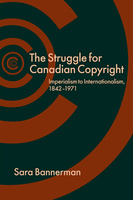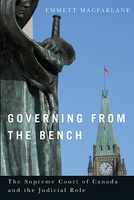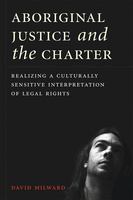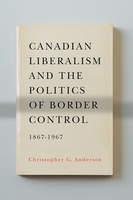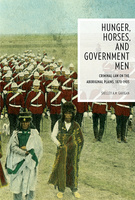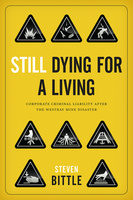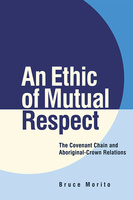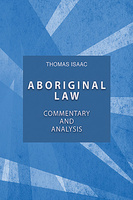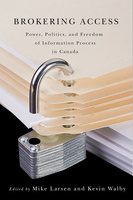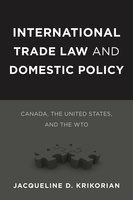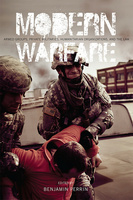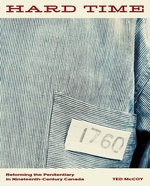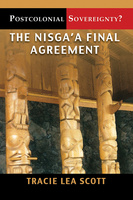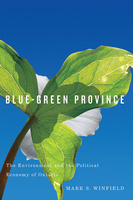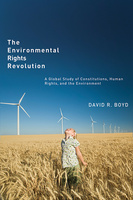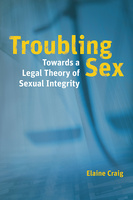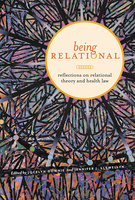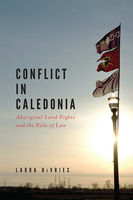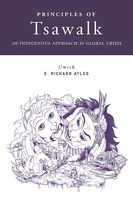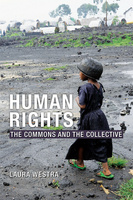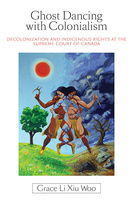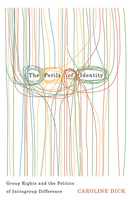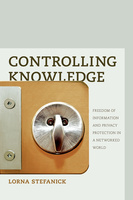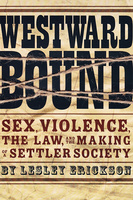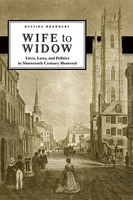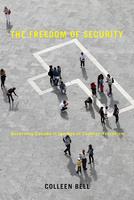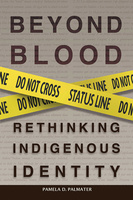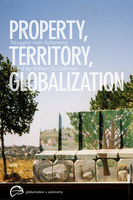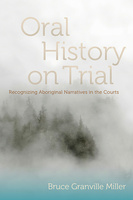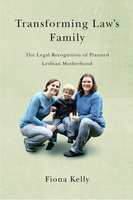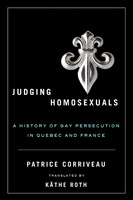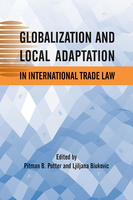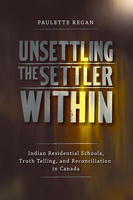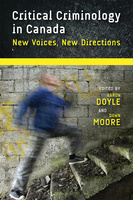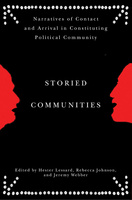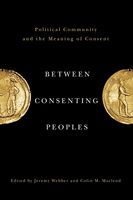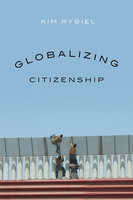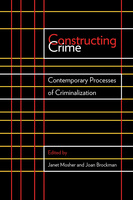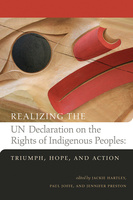The Struggle for Canadian Copyright
Imperialism to Internationalism, 1842-1971
The conflicts at the heart of international copyright are explored through the history of Canadian nation-building.
Governing from the Bench
The Supreme Court of Canada and the Judicial Role
Governing from the Bench is a comprehensive and illuminating examination of the Supreme Court of Canada that draws on in-depth interviews to reveal the inner workings of this often-misunderstood institution at the heart of Canada’s justice system.
Public Engagement and Emerging Technologies
This book examines current theory, methods, and ethics underlying global trends in involving publics in the governance of new technologies.
Aboriginal Justice and the Charter
Realizing a Culturally Sensitive Interpretation of Legal Rights
This book explores the tension between Aboriginal justice methods and the Canadian Charter of Rights and Freedoms, while searching for practical ways to implement Aboriginal justice.
Canadian Liberalism and the Politics of Border Control, 1867-1967
This book chronicles the first century of Canadian border control, revealing how policies have been influenced by changing perceptions of the rights of non-citizens.
Hunger, Horses, and Government Men
Criminal Law on the Aboriginal Plains, 1870-1905
Tells the complex story of the relationship between Plains Indians and Canadian criminal law as it took root in their land.
Still Dying for a Living
Corporate Criminal Liability after the Westray Mine Disaster
Still Dying for a Living investigates the state’s (in)ability to develop effective legal strategies for holding corporations accountable for serious injury and death in the workplace.
An Ethic of Mutual Respect
The Covenant Chain and Aboriginal-Crown Relations
This book holds up the Covenant Chain, the historical treaty relationship between the British Crown and indigenous people in North America, as a model for building an ethic of mutual respect to guide modern treaty disputes and land claims.
The Right to a Healthy Environment
Revitalizing Canada's Constitution
Renowned environmental lawyer David R. Boyd argues that Canada must constitutionalize environmental rights and responsibilities if it hopes to improve its environmental record.
Reasonable Accommodation
Managing Religious Diversity
Reasonable Accommodation is a collection of essays examining the meaning of reasonable accommodation of religious diversity through law and public discourse in Canada and abroad.
Aboriginal Law, Fourth Edition
Commentary and Analysis
Now in its 4th edition, this definitive text discusses and clarifies Canadian laws impacting Aboriginal peoples.
Brokering Access
Power, Politics, and Freedom of Information Process in Canada
Drawing together the perspectives of social scientists, journalists, and ATI advocates, Brokering Access explores the policies and practices surrounding access to information in Canada, highlighting the struggle between the public’s desire for transparency and the government’s culture of secrecy.
International Trade Law and Domestic Policy
Canada, the United States, and the WTO
An innovative assessment of the extent to which international judicial bodies influence domestic law and policy arrangements.
City of Order
Crime and Society in Halifax, 1918-35
A groundbreaking exploration of the causes and consequences of Halifax’s tough-on-crime measures in the interwar era.
Modern Warfare
Armed Groups, Private Militaries, Humanitarian Organizations, and the Law
A multifaceted exploration of how humanitarian organizations, private militaries, and non-state armed groups are shaking the foundations of international humanitarian law.
Hard Time
Reforming the Penitentiary in Nineteenth-Century Canada
Tracing the rise and evolution of Canadian penitentiaries in the nineteenth century, this book examines the concepts of criminality and rehabilitation, the role of labour in penal regimes, and the problem of violence.
The Canadian Yearbook of International Law, Vol. 48, 2010
This is the forty-eighth volume of The Canadian Yearbook of International Law, the first volume of which was published in 1963.
Postcolonial Sovereignty?
The Nisga’a Final Agreement
An extensive examination of the significant Nisga’a Final Agreement and the effect on Aboriginal and government relations.
Blue-Green Province
The Environment and the Political Economy of Ontario
Blue-Green Province provides the first comprehensive study of environmental policy in Ontario and explores what lessons on the future of environmental and economic policy in Canada might be learned from this province’s experience.
The Environmental Rights Revolution
A Global Study of Constitutions, Human Rights, and the Environment
David Boyd shows that recognition of the right to a healthy environment is not only growing, it is having a profound influence on public policy and environmental protection.
Troubling Sex
Towards a Legal Theory of Sexual Integrity
Focusing on the Supreme Court of Canada, Craig attempts to overcome the constraints of theoretical frameworks and disciplinary boundaries by pursuing a more inclusive theory of law and sexuality.
Being Relational
Reflections on Relational Theory and Health Law
This groundbreaking collection explores relational theory and how it can be brought to bear on practical areas of concern in health law and policy.
Conflict in Caledonia
Aboriginal Land Rights and the Rule of Law
A powerful account of how land disputes reflect complex and often competing understandings of law, landscape, and identity among First Nations and non-Aboriginal people in Canada.
Principles of Tsawalk
An Indigenous Approach to Global Crisis
Hereditary chief Umeek weaves together Nuu-chah-nulth and Western worldviews to revitalize contemporary approaches to the environment and the plight of indigenous peoples.
Human Rights
The Commons and the Collective
Laura Westra argues that international and environmental law must place the rights of the collective before those of the individual if we are to protect our common heritage -- the environment, its air, water, and biodiversity -- and ensure humanity’s survival.
Ghost Dancing with Colonialism
Decolonization and Indigenous Rights at the Supreme Court of Canada
Drawing on history, international law, and recent decision-making in the Supreme Court, this book seeks the truth behind allegations that Canadian law continues to colonize Indigenous peoples.
The Perils of Identity
Group Rights and the Politics of Intragroup Difference
Caroline Dick asks how group identity claims, especially in the courts, obscure significant intragroup differences.
Controlling Knowledge
Freedom of Information and Privacy Protection in a Networked World
How current legislation governs privacy and freedom in the digital age.
Westward Bound
Sex, Violence, the Law, and the Making of a Settler Society
Through the study of hundreds of criminal cases, Westward Bound explores how encounters between the courts and ordinary people on the Canadian Prairies contributed to the construction of race, class, and gender hierarchies in a settler society.
Wife to Widow
Lives, Laws, and Politics in Nineteenth-Century Montreal
The diversity of women’s lives as wives then as widows negotiating the law, patriarchy, family relationships, and the economy in 19th-century Montreal come alive in this first major study of widows in Canada.
Corporate Social Responsibility and the State
International Approaches to Forest Co-Regulation
This book provides a clear theoretical lens and practical guidance on the prospects and limits of leveraging private corporate social responsibility standards, such as forest certification, alongside government regulatory efforts to achieve more effective and adaptive sustainability solutions.
The Freedom of Security
Governing Canada in the Age of Counter-Terrorism
A trenchant exploration of how security and counter-terrorism practices are not only eroding civil liberties, but reshaping the very nature of our political freedom.
Beyond Blood
Rethinking Indigenous Identity
Despite what the criteria of the Indian Act states regarding Aboriginal status, Palmater argues that blood should not determine belonging.
Property, Territory, Globalization
Struggles over Autonomy
Focusing on sites of friction in property regimes, this book reveals that a politics of place can help local actors build bases of autonomy to withstand, and even reshape, the forces of globalization.
Oral History on Trial
Recognizing Aboriginal Narratives in the Courts
This compelling analysis of Aboriginal, legal, and anthropological concepts of fact and evidence argues for the inclusion of Aboriginal oral histories in Canadian courts, and pushes for a reconsideration of the Crown's approach to oral history.
Transforming Law's Family
The Legal Recognition of Planned Lesbian Motherhood
Drawing on the rarely heard voices of Canada’s lesbian mothers, Transforming Law’s Family explores the legal dimensions of planned lesbian parenthood and proposes avenues for legal change.
Judging Homosexuals
A History of Gay Persecution in Quebec and France
This history examines shifting constructions of homosexuality over time through a comparative analysis of gay persecution in France and Quebec.
Globalization and Local Adaptation in International Trade Law
Drawing on case studies from the Pacific Rim, this book traces the selective adaptation of international trade law to local conditions.
The Canadian Yearbook of International Law, Vol. 47, 2009
This is the forty-seventh volume of The Canadian Yearbook of International Law, which contains articles of lasting significance in the field of international legal studies.
Unsettling the Settler Within
Indian Residential Schools, Truth Telling, and Reconciliation in Canada
Unsettling the Settler Within is a powerful call to action that lays bare the myth of the peacemaking settler and points the way toward a meaningful reconciliation between Aboriginal and non-Aboriginal Canadians grappling with the legacy of the Indian residential school system.
Critical Criminology in Canada
New Voices, New Directions
A new generation of critical criminologists examines the future of criminology and criminal justice in Canada.
Storied Communities
Narratives of Contact and Arrival in Constituting Political Community
An exploration of the role of storytelling in community and nation building that disrupts the assumption in many works that indigenous and immigrant identities fall into two separate streams of analysis.
Between Consenting Peoples
Political Community and the Meaning of Consent
This book examines how consent might be understood as the foundation of legal and political community, especially in relations between indigenous and nonindigenous peoples.
In Defence of Principles
NGOs and Human Rights in Canada
This exploration of the activities of four Canadian NGOs in advancing and defending human rights principles sheds new light on the fragility and resilience of human rights norms in liberal democracies.
Globalizing Citizenship
This book traces how border controls and detention practices, particularly in the post-9/11 era, are transforming citizenship into a globalizing regime to regulate mobility.
Panoptic Dreams
Streetscape Video Surveillance in Canada
A definitive study of the implementation and implications of streetscape video surveillance systems in Canada.
The Politics of Acknowledgement
Truth Commissions in Uganda and Haiti
This book examines the failure of truth commissions in Uganda and Haiti and develops a rigorous framework to evaluate truth commissions around the world.
The Practice of Execution in Canada
The first comprehensive examination of execution as a social institution in Canada.
Constructing Crime
Contemporary Processes of Criminalization
Five unique case studies reveal how crime is being constructed and enforced in contemporary Canada.
Realizing the UN Declaration on the Rights of Indigenous Peoples
Triumph, Hope, and Action
A multidisciplinary collection analyzing the development of the Declaration, the triumph of its adoption, and the hopes and actions for its implementation.

